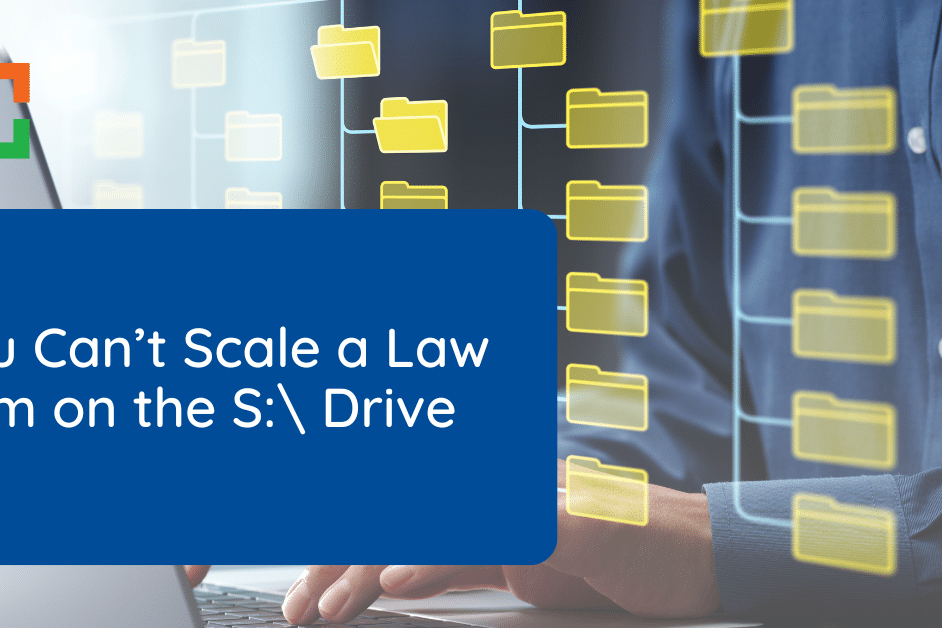Role-Specific Benefits of Document Management Software for Law Firms
 Most articles about document management software talk about features—cloud storage, version control, search. But here’s the thing: none of that matters unless it actually makes your workday easier.
Most articles about document management software talk about features—cloud storage, version control, search. But here’s the thing: none of that matters unless it actually makes your workday easier.
This article takes a different approach.
Instead of listing technical specs, we’re looking at how legal document management software supports the people who use it—lawyers, paralegals, IT managers, even clients. Every role in a law firm has its own needs, workflows, and priorities. A good DMS meets all of them.
Let’s break it down, role by role.
Every member of your law firm benefits from robust, legal-centric document management software, like LexWorkplace. Keep reading to learn more.
In This Article
- What Is Legal Document Management Software?
- Why Document Management Matters for Every Role
- Lawyers: Secure, Searchable, and Matter-Centric DMS Tools
- Paralegals: Streamlined Case Management and Automation
- Legal Secretaries: Organizing, Tagging, and Redacting with Ease
- IT Managers: Secure, Integrated Document Management Systems
- Compliance Officers: Audit Trails, E-Discovery, and Peace of Mind
- Litigation Support Staff: Managing Evidence and Discovery Files
- Firm Administrators: Centralized Control and Operational Efficiency
- Clients: Trust, Security, and Transparent Communication
- The Bottom Line
- Frequently Asked Questions
What Is Legal Document Management Software?
Legal document management software (DMS) is a centralized system designed specifically for law firms to store, organize, secure, and retrieve documents and emails.
Unlike general-purpose cloud storage, a legal DMS is built around how law firms work—organizing files by client and matter, maintaining version history, and supporting compliance with legal and ethical standards.
It’s more than digital filing—it’s a foundation for secure collaboration, streamlined workflows, and better service delivery across the entire firm.
Why Document Management Matters for Every Role
Every person at a law firm touches documents—whether drafting, reviewing, organizing, securing, or sharing them. And yet, most discussions about document management focus only on features or firm-wide benefits.
But the truth is: the impact of a legal DMS is deeply role-specific.
Attorneys need fast, reliable access to case files. Paralegals need tools that streamline drafting and redaction. IT managers care about security and integration. Clients expect responsiveness and confidentiality.
This section-by-section breakdown explores how the right document management system supports each of these roles—helping everyone work more securely, efficiently, and confidently.
Lawyers: Secure, Searchable, and Matter-Centric DMS Tools
Lawyers need more than a place to store files—they need a system that fits the way they work.
A legal document management system should provide matter-centric organization, making it easy to locate case-related files, briefs, and correspondence without digging through folders.
Full-text search allows attorneys to instantly retrieve what they need—whether it’s a specific contract clause or an email thread from six months ago. And with document versioning, lawyers can confidently track changes, revert to previous drafts, and avoid costly mistakes.
Most importantly, all of this must be done securely. Lawyers handle privileged, often confidential, material. A legal DMS ensures that files are encrypted, access is controlled, and client data is protected—on every device, in every location.
For lawyers, the right DMS isn’t just convenient—it’s critical to delivering fast, informed, and secure legal work.
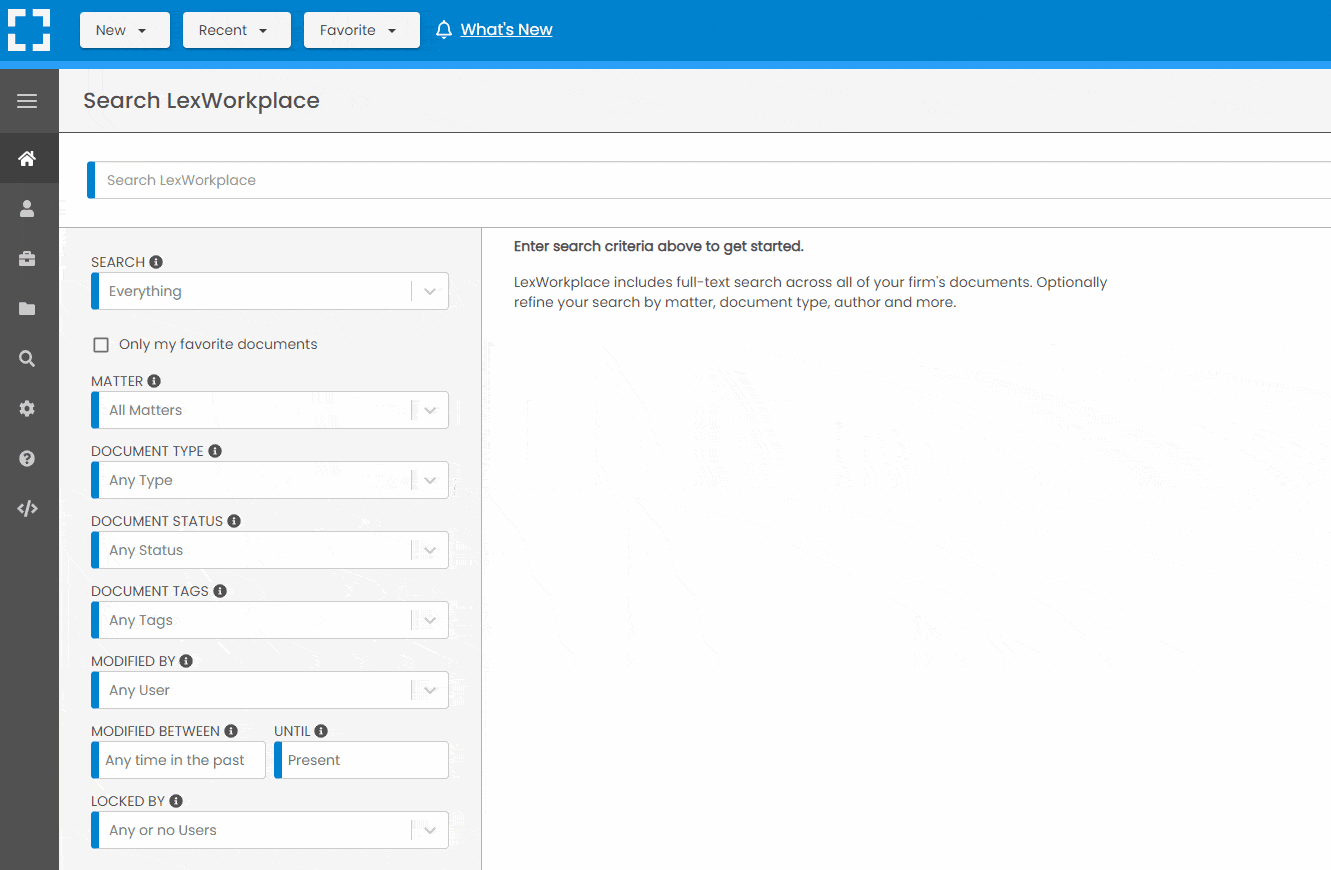
Paralegals: Streamlined Case Management and Automation
Paralegals are the operational backbone of most law firms. They draft documents, manage filings, coordinate with courts, and keep matters moving forward. A legal document management system should make this easier—not harder.
With document tracking, paralegals can see who last edited a file and when, reducing confusion and eliminating version mix-ups. Redaction tools allow them to quickly prepare documents for court or client review without relying on third-party software. And workflow automation features can help manage routine tasks like document routing or approval processes.
Equally important is compliance. Paralegals are often responsible for ensuring that filings meet regulatory requirements. A legal DMS with audit trails and permission controls helps maintain integrity, security, and accountability—especially when multiple people are touching a file.
For paralegals, the right DMS cuts down on busywork, reduces risk, and supports more efficient, compliant case management.
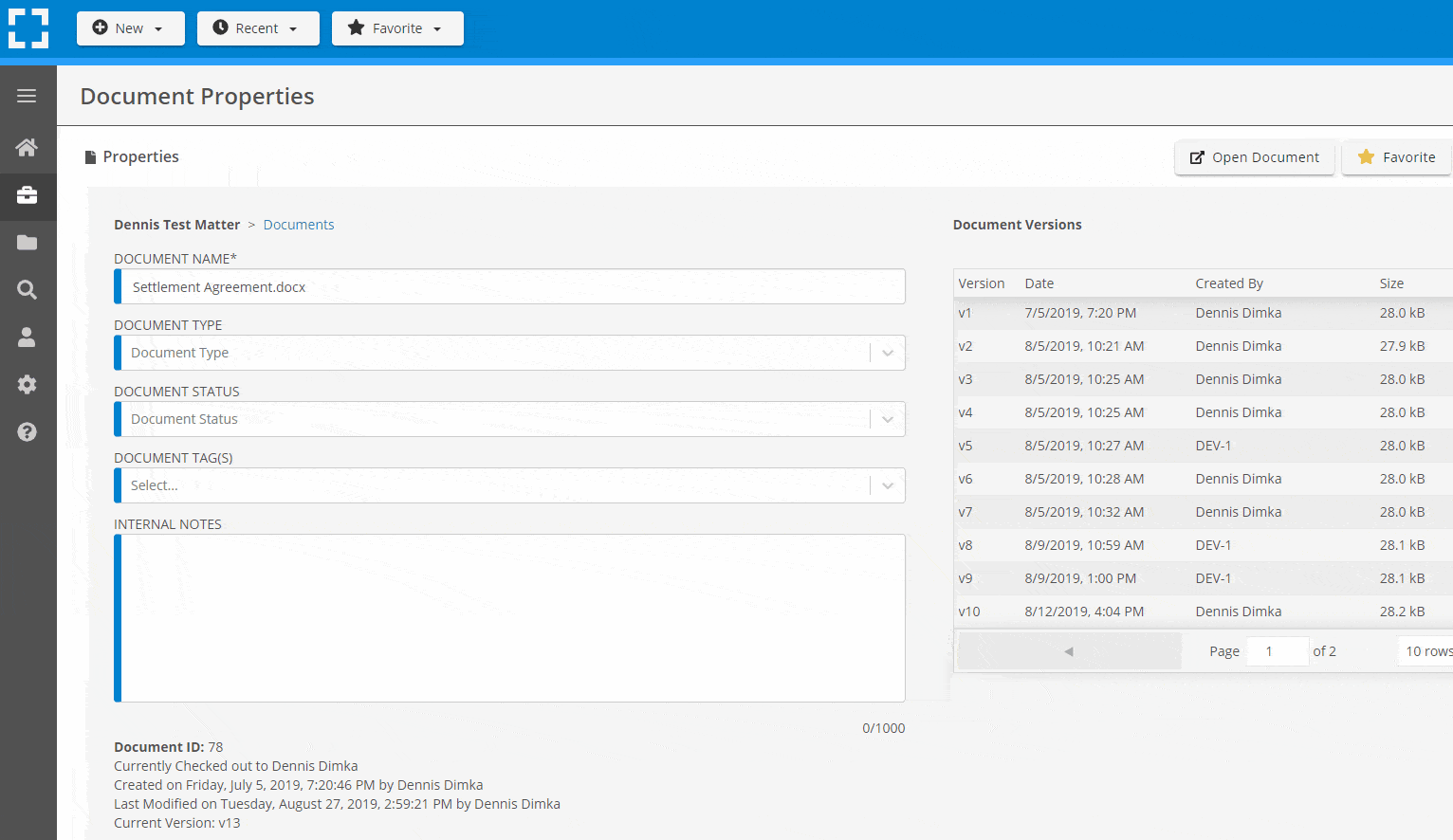
Legal Secretaries: Organizing, Tagging, and Redacting with Ease
Legal secretaries play a critical role in keeping documents organized, accurate, and accessible. From preparing filings to maintaining correspondence, their work depends on having a document system that is both reliable and intuitive.
A good legal DMS supports document profiling and tagging, making it easy to file documents by client, matter, type, or deadline. This ensures consistency across the firm and prevents misplaced or misnamed files from slipping through the cracks.
Redaction tools and version tracking are especially valuable for legal secretaries, who often prepare documents for outside parties or finalize edits made by attorneys. These features help maintain document integrity, reduce rework, and protect confidential information.
Ultimately, a strong DMS allows legal secretaries to work more efficiently—cutting down on time spent manually organizing files and enabling them to better support attorneys and paralegals.
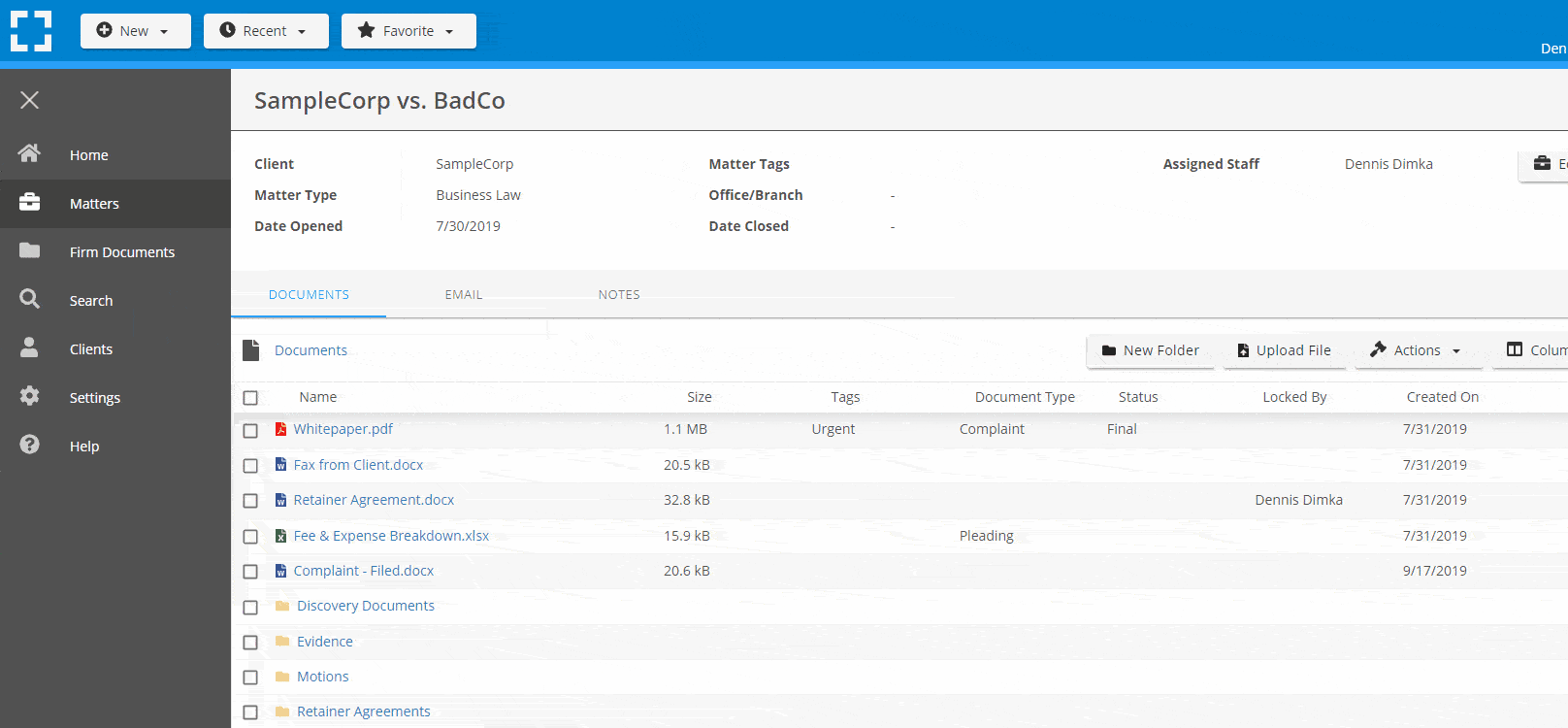
IT Managers: Secure, Integrated Document Management Systems
For IT managers, document management software is more than a convenience—it’s a matter of infrastructure, risk management, and system integrity.
A legal DMS should offer robust security features like encryption, user-level permissions, and secure remote access. With cyber threats on the rise, IT professionals need confidence that sensitive documents are protected—whether they’re accessed in the office, at home, or on a mobile device.
System integration is another top priority. A DMS that plays well with Microsoft 365, Outlook, and legal practice management software reduces friction and eliminates data silos. The result: less downtime, fewer user errors, and smoother workflows.
Device compatibility—especially across Windows and Mac—is also essential for modern law firms with mixed environments. And for IT, fewer support tickets and a more intuitive interface translate into better productivity across the board.
For IT managers, the right DMS means fewer headaches, stronger security, and a seamless user experience for the entire firm.
LexWorkplace Security
Cloud-based Document Management
- 256-bit Military-Grade Encryption
- Data Encryption In-Transit
- Data Encryption At-Rest
- Geographic Redundancy
- Multi-Factor Authentication
- Permissions
- Groups
Compliance Officers: Audit Trails, E-Discovery, and Peace of Mind
Compliance officers are tasked with ensuring that a law firm’s systems and practices meet ethical, legal, and regulatory standards. When it comes to document management, that means visibility, control, and accountability.
A legal DMS should offer detailed audit trails that track who accessed, edited, or shared a document—and when. These logs aren’t just useful for internal oversight; they’re essential in the event of an audit or dispute.
For firms engaged in litigation, e-discovery support is a must. The ability to search, filter, and export documents quickly can make or break discovery deadlines. And with built-in permissions management, compliance officers can enforce access controls to limit risk and maintain client confidentiality.
Ultimately, a DMS that supports compliance isn’t just a checkbox—it’s a safeguard against liability and a key part of the firm’s risk management strategy.
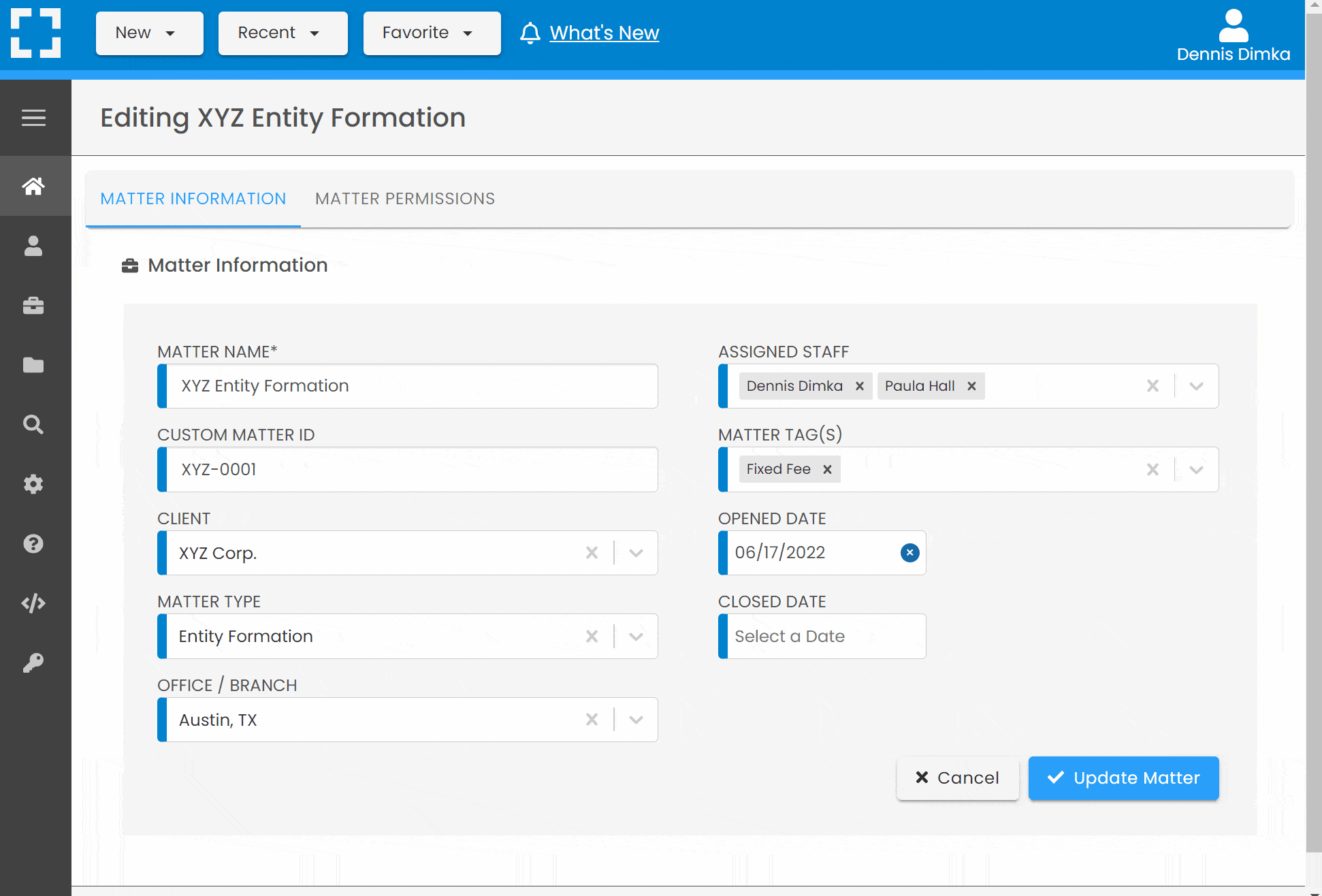
Litigation Support Staff: Managing Evidence and Discovery Files
Litigation support teams are responsible for organizing, processing, and producing vast amounts of information—often under intense deadlines. A legal DMS plays a vital role in helping them stay on top of it all.
With features like optical character recognition (OCR) and full-text search, litigation support professionals can quickly find keywords or references buried within scanned documents, PDFs, or email attachments. This speeds up document review and ensures nothing critical gets missed.
The ability to tag, index, and categorize evidence by case, issue, or timeline streamlines the entire discovery process. Combined with version control and audit trails, these tools help preserve the chain of custody and maintain a clear record of what was done—and when.
For litigation support staff, the right DMS isn’t just helpful—it’s essential for managing complex discovery workflows and delivering timely, organized results to attorneys and clients.
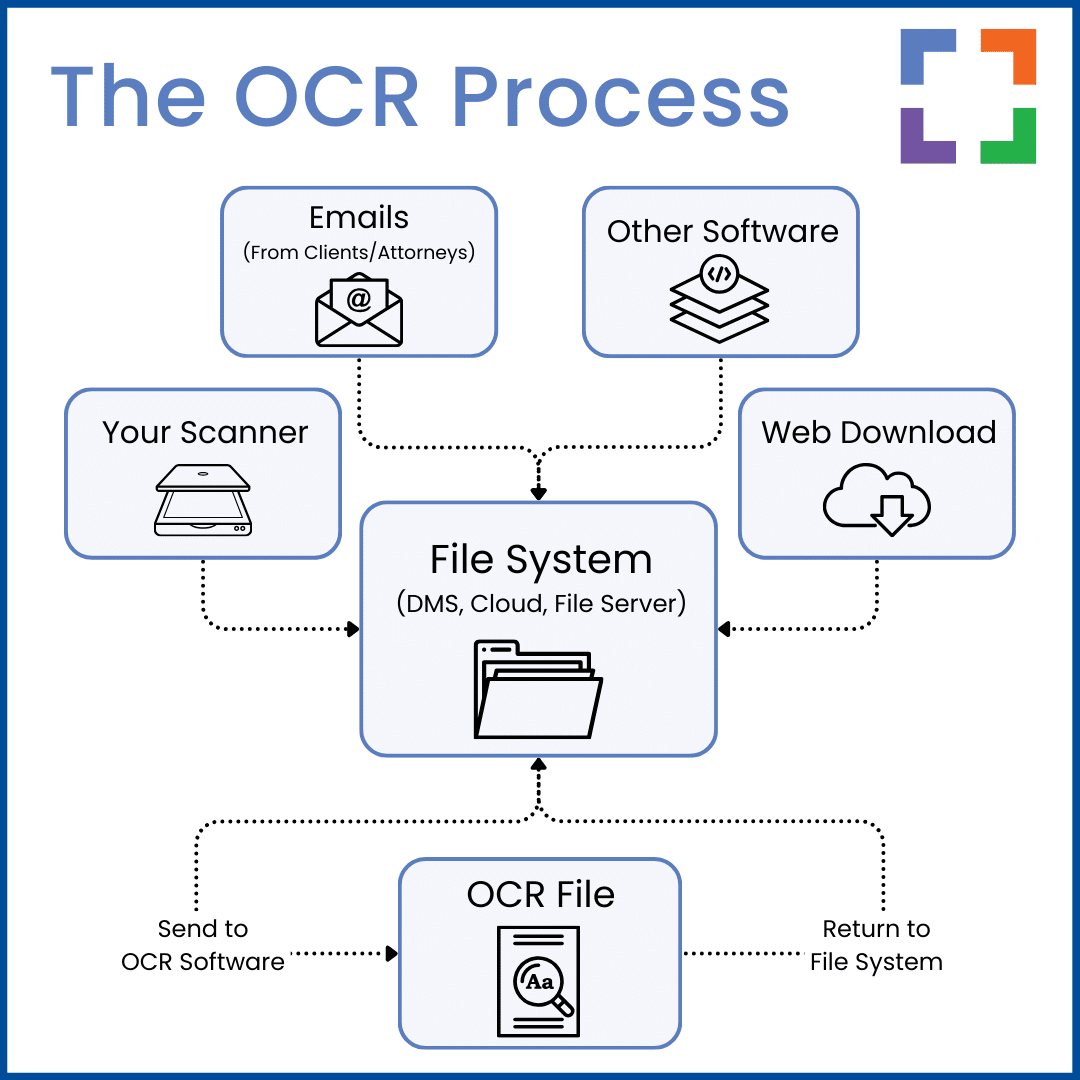
Firm Administrators: Centralized Control and Operational Efficiency
Firm administrators are responsible for the smooth day-to-day operation of the entire legal practice. That includes everything from managing software licenses to enforcing policies and ensuring that staff have the tools they need to be productive. A well-implemented legal DMS is a powerful ally in that mission.
With centralized user management, firm administrators can easily control who has access to which documents—by role, department, or client matter. Usage reporting and audit logs provide visibility into system activity, helping identify bottlenecks or compliance risks before they become issues.
The right DMS also enables workflow standardization, ensuring that documents are consistently profiled, tagged, and stored. This reduces redundancies, prevents rework, and creates firm-wide consistency that improves both productivity and professionalism.
For firm administrators, a legal DMS offers control, clarity, and the ability to scale operations without adding chaos.
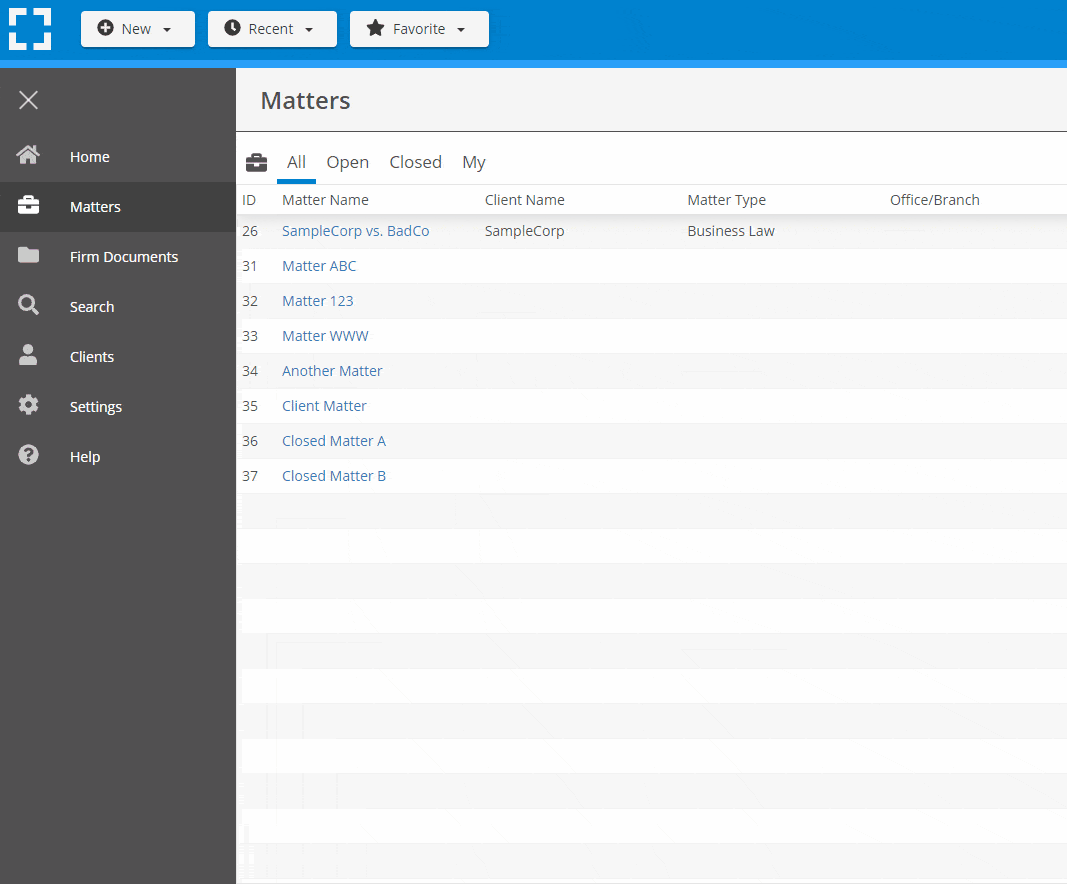
Clients: Trust, Security, and Transparent Communication
While clients may never log into your document management system, they feel its impact every time they work with your firm. A good legal DMS helps ensure that their sensitive information is stored securely, shared appropriately, and easy for your team to retrieve when needed.
Secure file sharing and client portals provide a confidential and professional way to exchange documents—avoiding the risks of email attachments or unsecured links. Version control ensures that clients are always reviewing the most accurate draft, and audit trails provide peace of mind that their information hasn’t been mishandled.
Clients may not ask what document management system your firm uses—but they’ll notice if it’s slow, disorganized, or insecure. A reliable DMS reinforces trust, enhances responsiveness, and demonstrates that your firm takes confidentiality and communication seriously.
LexWorkplace Success Story
See how one law firm uses LexWorkplace to organize their documents and streamline their practice.
Book a 15-Minute Demo
The Bottom Line on Legal DMS
Legal document management software isn’t just about storing files—it’s about empowering every role at your law firm to work more securely, efficiently, and confidently.
From attorneys to clients, a well-designed DMS supports the unique needs of each user while reinforcing consistency, compliance, and control across the firm.
Choosing the right system means evaluating how it performs for everyone, not just IT or leadership. Because when your DMS works for every role, your entire firm works better.
Frequently Asked Questions
Each role—lawyer, paralegal, legal secretary, IT, compliance, and beyond—has unique needs. A good legal DMS supports those needs with features like matter-centric organization for attorneys, redaction tools for paralegals, audit logs for compliance officers, and centralized control for firm administrators.
Lawyers need fast, secure access to documents organized by matter. Full-text search, version control, and reliable access across devices are essential for staying productive and protecting client confidentiality.
Paralegals benefit from document tracking, redaction, and automation features that streamline drafting, filing, and compliance tasks—freeing them to focus on higher-value case work.
Legal secretaries use DMS tools to tag, profile, and organize files. Features like version tracking and redaction ensure that finalized documents are accurate, compliant, and ready for court or client delivery.
IT professionals prioritize encryption, device compatibility, system reliability, and integration with practice management platforms. A strong DMS reduces support needs and enhances firm-wide security.
A legal DMS helps maintain compliance through detailed audit trails, permission-based access, encryption, and document retention policies—all vital for passing audits and protecting sensitive data.
Yes. Features like OCR, document indexing, tagging, and version history help litigation support staff manage evidence, track discovery materials, and maintain chain of custody.
Administrators gain centralized oversight of users, documents, and workflows. This means better productivity tracking, fewer errors, and smoother onboarding of new staff.
Absolutely. Clients experience faster responses, secure file sharing, and better communication. A good DMS reflects professionalism and instills trust that their data is safe.
Law firms should evaluate how a DMS serves each role within the firm—not just its feature list. The best systems enhance efficiency, security, and usability for everyone, from attorneys to support staff to clients.
Looking for Document Management Software?
LexWorkplace:
Modern Document Management for Law Firms
LexWorkplace is document & email management software, born in the cloud and built for law firms. Here’s a quick primer on how it works, or get your free trial to discover LexWorkplace for yourself.
Organize by Client & Matter
Organize documents, email and notes by client or matter. Store and manage all data for a case or project in one place.
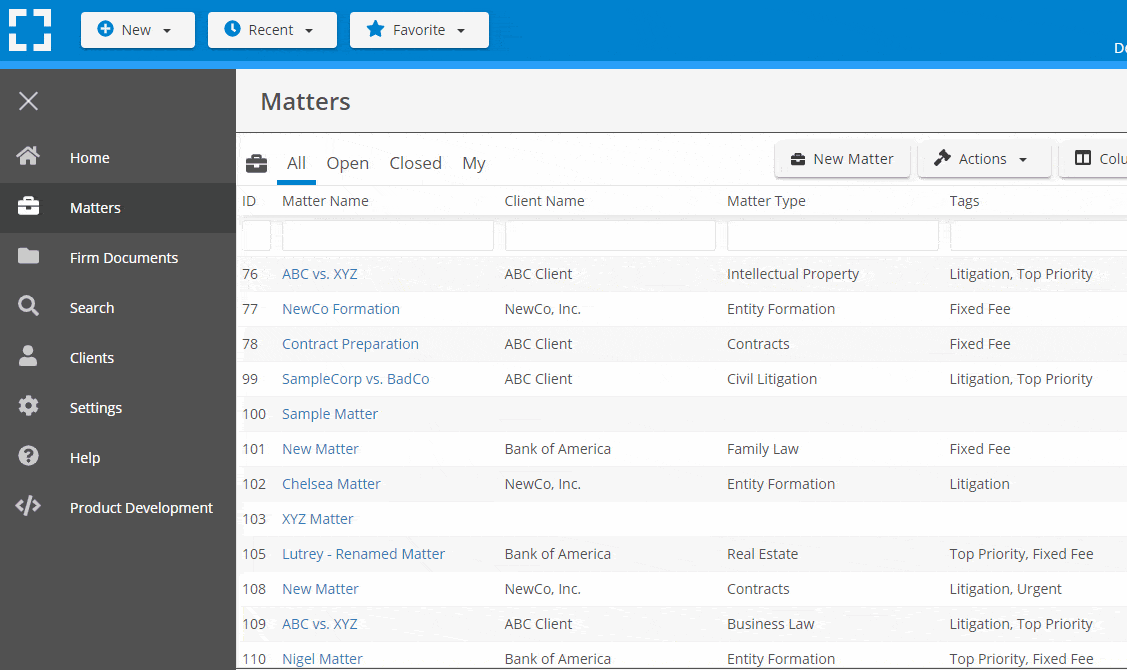
Go Beyond Basic Files & Folders
Supercharge your firm’s productivity with true DMS functions.
- Version Management
- Document Tagging & Profiling
- Document Check-Out / Check-In
- Microsoft Office Integration
- Automatic, Integrated OCR
- Convert Word Docs to PDF

Search Everything
LexWorkplace is like Google for your law firm. Search across millions of pages, documents, folder email and notes in seconds. Refine your search by matter, document type, author and more.

Search by…
- Client or Matter
- Document Type (Contract, Complaint, Order, etc.)
- Document Status (Draft, Final, etc.)
- Document Tags (Filed With Court, Fully Executed, etc.)
Outlook Integration + Comprehensive Email Management
Save emails to a matter without leaving Outlook. Saved emails are accessible to your entire team, organized and searchable.
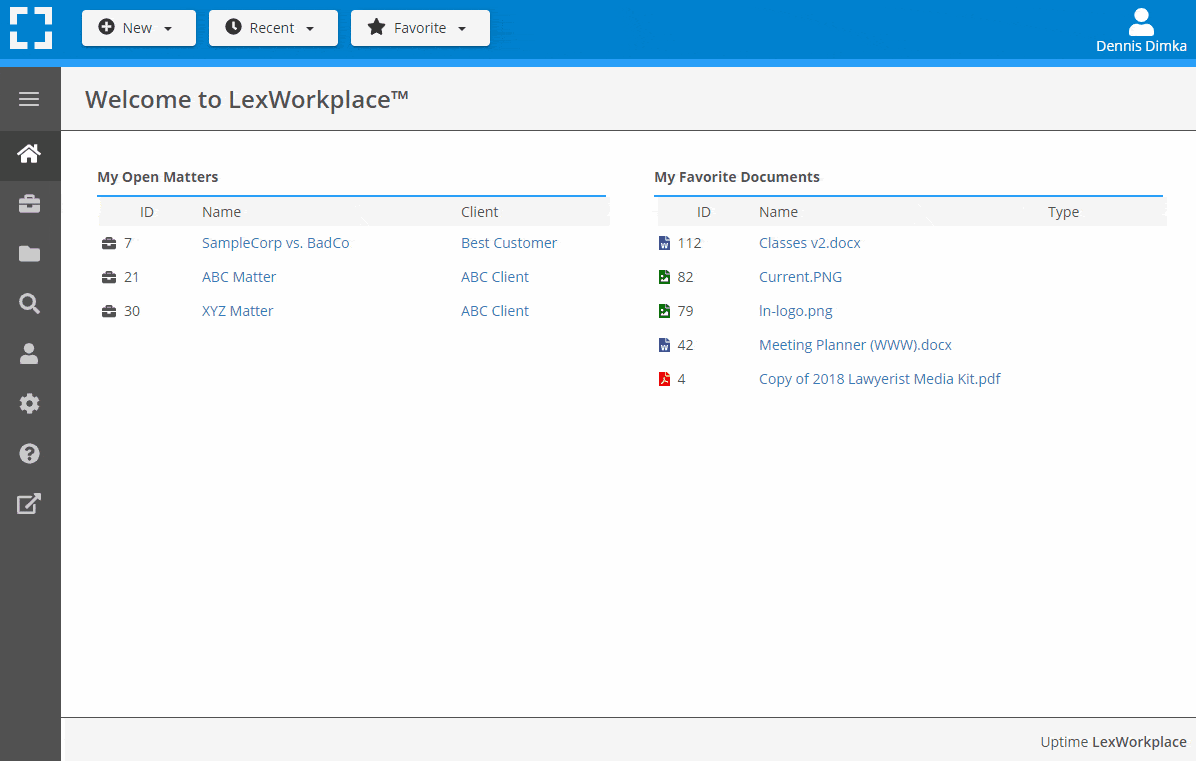
- Outlook Add-In that Works With Windows and Macs
- Save Entire, Original Email to a Matter in a LexWorkplace
- Email De-Duplication
- Organize Emails into Folders, Subfolders
Works with Windows and Macs
All of LexWorkplace is compatible with both Windows and Mac computers.
Next Steps
See What Clients Have to Say
Lawyers love LexWorkplace. See how the system streamlined one lawyer’s practice.
Watch the 5-Minute Demo
See LexWorkplace in action in our quick 5-minute overview and demonstration.
Or, if you want a one-on-one demo, or want to talk about LexWorkplace for your firm, schedule a call or demo below.
Frequently Asked Questions - Best Cloud Storage for Law Firms
Cloud storage enables access to documents from anywhere, improves security and compliance, and eliminates the need for VPNs.
Cloud storage offers basic file storage, while a DMS provides features like document tagging, full-text search, and version control.
Services like OneDrive, Google Drive, and Dropbox are suitable for smaller firms needing basic storage solutions.
Law firms handle sensitive data and must comply with regulations like HIPAA, requiring strong encryption and authentication.
Common issues include limited document management features, syncing problems, and lack of email management.
Yes, cloud solutions offer scalable storage based on usage, which can be more cost-effective than on-premise servers.
Look for full-text search, document versioning, data encryption, and support for both Windows and Mac.
DMS platforms offer advanced features like matter-centric organization, integrated email management, and document profiling.
Yes, many cloud storage providers offer tools to help law firms comply with data security regulations like HIPAA.
Popular options include Microsoft OneDrive, Google Drive, Dropbox, and LexWorkplace for more robust legal-centric needs.
Looking for Document Management Software?
LexWorkplace:
Modern Document Management for Law Firms
LexWorkplace is document & email management software, born in the cloud and built for law firms. Here’s a quick primer on how it works, or get your free trial to discover LexWorkplace for yourself.
Organize by Client & Matter
Organize documents, email and notes by client or matter. Store and manage all data for a case or project in one place.

Go Beyond Basic Files & Folders
Supercharge your firm’s productivity with true DMS functions.
- Version Management
- Document Tagging & Profiling
- Document Check-Out / Check-In
- Microsoft Office Integration
- Automatic, Integrated OCR
- Convert Word Docs to PDF

Search Everything
LexWorkplace is like Google for your law firm. Search across millions of pages, documents, folder email and notes in seconds. Refine your search by matter, document type, author and more.

Search by…
- Client or Matter
- Document Type (Contract, Complaint, Order, etc.)
- Document Status (Draft, Final, etc.)
- Document Tags (Filed With Court, Fully Executed, etc.)
Outlook Integration + Comprehensive Email Management
Save emails to a matter without leaving Outlook. Saved emails are accessible to your entire team, organized and searchable.

- Outlook Add-In that Works With Windows and Macs
- Save Entire, Original Email to a Matter in a LexWorkplace
- Email De-Duplication
- Organize Emails into Folders, Subfolders
Works with Windows and Macs
All of LexWorkplace is compatible with both Windows and Mac computers.
Next Steps
See What Clients Have to Say
Lawyers love LexWorkplace. See how the system streamlined one lawyer’s practice.
Watch the 5-Minute Demo
See LexWorkplace in action in our quick 5-minute overview and demonstration.
Or, if you want a one-on-one demo, or want to talk about LexWorkplace for your firm, schedule a call or demo below.
You Might Also Like
Want More Legal Technology Tips?
Subscribe to Uptime Legal to get the latest legal tech tips and trends, delivered to your inbox weekly.
